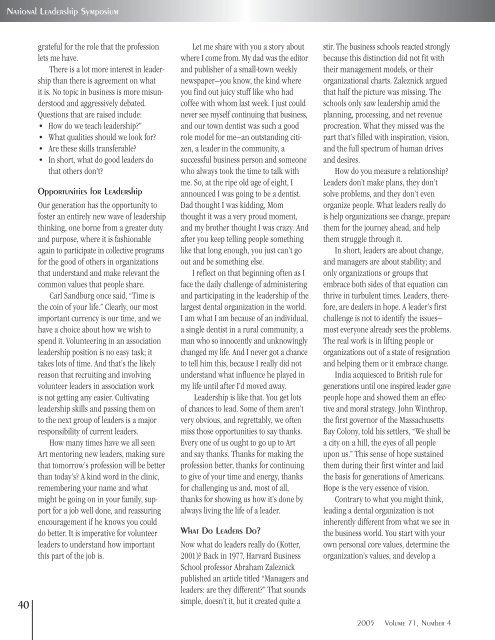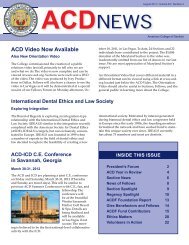JACD 71-4 - American College of Dentists
JACD 71-4 - American College of Dentists
JACD 71-4 - American College of Dentists
- No tags were found...
Create successful ePaper yourself
Turn your PDF publications into a flip-book with our unique Google optimized e-Paper software.
National Leadership Symposium<br />
40<br />
grateful for the role that the pr<strong>of</strong>ession<br />
lets me have.<br />
There is a lot more interest in leadership<br />
than there is agreement on what<br />
it is. No topic in business is more misunderstood<br />
and aggressively debated.<br />
Questions that are raised include:<br />
• How do we teach leadership?”<br />
• What qualities should we look for?<br />
• Are these skills transferable?<br />
• In short, what do good leaders do<br />
that others don’t?<br />
Opportunities for Leadership<br />
Our generation has the opportunity to<br />
foster an entirely new wave <strong>of</strong> leadership<br />
thinking, one borne from a greater duty<br />
and purpose, where it is fashionable<br />
again to participate in collective programs<br />
for the good <strong>of</strong> others in organizations<br />
that understand and make relevant the<br />
common values that people share.<br />
Carl Sandburg once said, “Time is<br />
the coin <strong>of</strong> your life.” Clearly, our most<br />
important currency is our time, and we<br />
have a choice about how we wish to<br />
spend it. Volunteering in an association<br />
leadership position is no easy task; it<br />
takes lots <strong>of</strong> time. And that’s the likely<br />
reason that recruiting and involving<br />
volunteer leaders in association work<br />
is not getting any easier. Cultivating<br />
leadership skills and passing them on<br />
to the next group <strong>of</strong> leaders is a major<br />
responsibility <strong>of</strong> current leaders.<br />
How many times have we all seen<br />
Art mentoring new leaders, making sure<br />
that tomorrow’s pr<strong>of</strong>ession will be better<br />
than today’s? A kind word in the clinic,<br />
remembering your name and what<br />
might be going on in your family, support<br />
for a job well done, and reassuring<br />
encouragement if he knows you could<br />
do better. It is imperative for volunteer<br />
leaders to understand how important<br />
this part <strong>of</strong> the job is.<br />
Let me share with you a story about<br />
where I come from. My dad was the editor<br />
and publisher <strong>of</strong> a small-town weekly<br />
newspaper—you know, the kind where<br />
you find out juicy stuff like who had<br />
c<strong>of</strong>fee with whom last week. I just could<br />
never see myself continuing that business,<br />
and our town dentist was such a good<br />
role model for me—an outstanding citizen,<br />
a leader in the community, a<br />
successful business person and someone<br />
who always took the time to talk with<br />
me. So, at the ripe old age <strong>of</strong> eight, I<br />
announced I was going to be a dentist.<br />
Dad thought I was kidding, Mom<br />
thought it was a very proud moment,<br />
and my brother thought I was crazy. And<br />
after you keep telling people something<br />
like that long enough, you just can’t go<br />
out and be something else.<br />
I reflect on that beginning <strong>of</strong>ten as I<br />
face the daily challenge <strong>of</strong> administering<br />
and participating in the leadership <strong>of</strong> the<br />
largest dental organization in the world.<br />
I am what I am because <strong>of</strong> an individual,<br />
a single dentist in a rural community, a<br />
man who so innocently and unknowingly<br />
changed my life. And I never got a chance<br />
to tell him this, because I really did not<br />
understand what influence he played in<br />
my life until after I’d moved away.<br />
Leadership is like that. You get lots<br />
<strong>of</strong> chances to lead. Some <strong>of</strong> them aren’t<br />
very obvious, and regrettably, we <strong>of</strong>ten<br />
miss those opportunities to say thanks.<br />
Every one <strong>of</strong> us ought to go up to Art<br />
and say thanks. Thanks for making the<br />
pr<strong>of</strong>ession better, thanks for continuing<br />
to give <strong>of</strong> your time and energy, thanks<br />
for challenging us and, most <strong>of</strong> all,<br />
thanks for showing us how it’s done by<br />
always living the life <strong>of</strong> a leader.<br />
What Do Leaders Do?<br />
Now what do leaders really do (Kotter,<br />
2001)? Back in 1977, Harvard Business<br />
School pr<strong>of</strong>essor Abraham Zaleznick<br />
published an article titled “Managers and<br />
leaders: are they different?” That sounds<br />
simple, doesn’t it, but it created quite a<br />
stir. The business schools reacted strongly<br />
because this distinction did not fit with<br />
their management models, or their<br />
organizational charts. Zaleznick argued<br />
that half the picture was missing. The<br />
schools only saw leadership amid the<br />
planning, processing, and net revenue<br />
procreation. What they missed was the<br />
part that’s filled with inspiration, vision,<br />
and the full spectrum <strong>of</strong> human drives<br />
and desires.<br />
How do you measure a relationship?<br />
Leaders don’t make plans, they don’t<br />
solve problems, and they don’t even<br />
organize people. What leaders really do<br />
is help organizations see change, prepare<br />
them for the journey ahead, and help<br />
them struggle through it.<br />
In short, leaders are about change,<br />
and managers are about stability; and<br />
only organizations or groups that<br />
embrace both sides <strong>of</strong> that equation can<br />
thrive in turbulent times. Leaders, therefore,<br />
are dealers in hope. A leader’s first<br />
challenge is not to identify the issues—<br />
most everyone already sees the problems.<br />
The real work is in lifting people or<br />
organizations out <strong>of</strong> a state <strong>of</strong> resignation<br />
and helping them or it embrace change.<br />
India acquiesced to British rule for<br />
generations until one inspired leader gave<br />
people hope and showed them an effective<br />
and moral strategy. John Winthrop,<br />
the first governor <strong>of</strong> the Massachusetts<br />
Bay Colony, told his settlers, “We shall be<br />
a city on a hill, the eyes <strong>of</strong> all people<br />
upon us.” This sense <strong>of</strong> hope sustained<br />
them during their first winter and laid<br />
the basis for generations <strong>of</strong> <strong>American</strong>s.<br />
Hope is the very essence <strong>of</strong> vision.<br />
Contrary to what you might think,<br />
leading a dental organization is not<br />
inherently different from what we see in<br />
the business world. You start with your<br />
own personal core values, determine the<br />
organization’s values, and develop a<br />
2005 Volume <strong>71</strong>, Number 4





